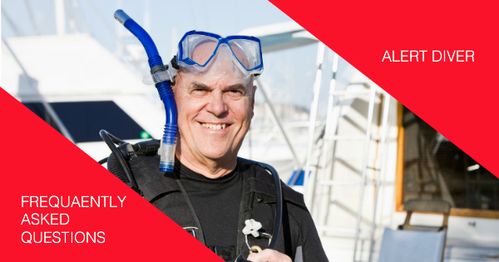Elderly Divers FAQ

I am 79 years old and healthy. I have not been diving in several years and would like to get back into it. Are there any recommendations, prohibitions or limitations for a diver my age?
Please note that DAN® is not a regulatory agency and does not set standards or guidelines for participation in diving. Any age or fitness limitations you encounter would come from training agencies or dive operations, not DAN. The responsibility for the decision of whether or not to dive is generally that of the individual and his or her physician. This decision, however, should be based on the most current diving medical information available.
Many people in their 70s and 80s continue to dive, although their diving style may change over time. The key to safe diving is physical fitness, not age. Or as some people glibly state, "It's not the age but the mileage that counts." An athletic, physically fit senior citizen may be a better candidate for diving than a 25-year-old in poor physical condition. But that same person will never match the physical capabilities of an athletic 25-year-old. All tissues — blood vessels, heart, lungs, muscles, etc. — age.
A thorough cardiac workup and stress test are prudent and probably the first priorities. Many cardiologists familiar with dive medicine recommend a cardiac stress test targeting a score of 13 metabolic equivalents (METs), while others recommend a minimum of 10 METs. Either level is rigorous exercise. While most diving is relaxing, a strong current, a long surface swim or rescuing a buddy (or oneself) all require a high level of exercise tolerance.
Awareness of underlying medical issues is of practical use. The basic aches of arthritis could be confused with decompression sickness, so conservative profiles are recommended for anyone who deals with this issue. Also, diving in locations with reasonable access to medical care is prudent. Anyone can have a medical or diving emergency, and age makes medical emergencies more likely. A minor issue that occurs within reasonable access to medical care can be handled easily. The same issue can be much more problematic on a remote island or liveaboard hours or days from medical care.
Many people in their 70s and 80s continue to dive, although their diving style may change over time. The key to safe diving is physical fitness, not age. Or as some people glibly state, "It's not the age but the mileage that counts." An athletic, physically fit senior citizen may be a better candidate for diving than a 25-year-old in poor physical condition. But that same person will never match the physical capabilities of an athletic 25-year-old. All tissues — blood vessels, heart, lungs, muscles, etc. — age.
A thorough cardiac workup and stress test are prudent and probably the first priorities. Many cardiologists familiar with dive medicine recommend a cardiac stress test targeting a score of 13 metabolic equivalents (METs), while others recommend a minimum of 10 METs. Either level is rigorous exercise. While most diving is relaxing, a strong current, a long surface swim or rescuing a buddy (or oneself) all require a high level of exercise tolerance.
Awareness of underlying medical issues is of practical use. The basic aches of arthritis could be confused with decompression sickness, so conservative profiles are recommended for anyone who deals with this issue. Also, diving in locations with reasonable access to medical care is prudent. Anyone can have a medical or diving emergency, and age makes medical emergencies more likely. A minor issue that occurs within reasonable access to medical care can be handled easily. The same issue can be much more problematic on a remote island or liveaboard hours or days from medical care.
Posted in Dive Safety FAQ
Categories
2025
2024
February
March
April
May
October
My name is Rosanne… DAN was there for me?My name is Pam… DAN was there for me?My name is Nadia… DAN was there for me?My name is Morgan… DAN was there for me?My name is Mark… DAN was there for me?My name is Julika… DAN was there for me?My name is James Lewis… DAN was there for me?My name is Jack… DAN was there for me?My name is Mrs. Du Toit… DAN was there for me?My name is Sean… DAN was there for me?My name is Clayton… DAN was there for me?My name is Claire… DAN was there for me?My name is Lauren… DAN was there for me?My name is Amos… DAN was there for me?My name is Kelly… DAN was there for me?Get to Know DAN Instructor: Mauro JijeGet to know DAN Instructor: Sinda da GraçaGet to know DAN Instructor: JP BarnardGet to know DAN instructor: Gregory DriesselGet to know DAN instructor Trainer: Christo van JaarsveldGet to Know DAN Instructor: Beto Vambiane
November
Get to know DAN Instructor: Dylan BowlesGet to know DAN instructor: Ryan CapazorioGet to know DAN Instructor: Tyrone LubbeGet to know DAN Instructor: Caitlyn MonahanScience Saves SharksSafety AngelsDiving Anilao with Adam SokolskiUnderstanding Dive Equipment RegulationsDiving With A PFOUnderwater NavigationFinding My PassionDiving Deep with DSLRDebunking Freediving MythsImmersion Pulmonary OedemaSwimmer's EarMEMBER PROFILE: RAY DALIOAdventure Auntie: Yvette OosthuizenClean Our OceansWhat to Look for in a Dive Boat
2023
January
March
Terrific Freedive ModeKaboom!....The Big Oxygen Safety IssueScuba Nudi ClothingThe Benefits of Being BaldDive into Freedive InstructionCape Marine Research and Diver DevelopmentThe Inhaca Ocean Alliance.“LIGHTS, Film, Action!”Demo DiversSpecial Forces DiverWhat Dive Computers Don\'t Know | PART 2Toughing It Out Is Dangerous
April

No Comments